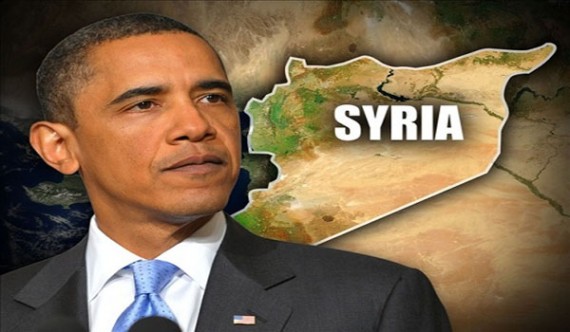If We Do Attack Syria, What’s Next?
Some questions that the Administration needs to answer before attacking Syria.
Over at his own blog, Dave Schuler poses a series of questions regarding the Administration’s apparent plans to launch some kind of attack against Syria in retaliation for the alleged use of chemical weapons:
Assume an attack on Syria is unsuccessful in the sense that Assad continues to use chemical weapons after the attack. What then?
Assume an attack on Syria is successful, Assad stops using chemical weapons (he might have done so anyway), but he is able to defeat the rebels without them. What then?
Assume an attack on Syria is successful, Assad stops using chemical weapons (he might have done so anyway), he is unable to defeat the rebels outright, and the civil war just continues. What then?
Assume an attack on Syria is successful and Assad, hamstringed in his attempts to preserve his regime, is ousted by the rebels. The rebels are radical Islamists. What then?
We attack Syria. Syria, Iran, or both retaliate by attacking Americans or American interests in the Middle East using asymmetric warfare techniques. What then?
We attack Syria. An American aircraft carrier is sunk by asymmetric warfare techniques (that’s actually occurred in war games of conflict in the Middle East). What then?
To this I’d add one more:
We attack Syria. Syria, Iran, Hezbollah, or some other non-state actor connected to the two nations respond by attacking Israel (i.e. via rocket or mortar attacks launched from Hezbollah-controlled Lebanon or Hamas-controlled Gaza). What then?
We attack Syria. The “Syrian Electronic Army,” which appears to be some kind of widely dispersed group of hackers, responds by launching multiple attacks on private and public computer systems in the United States and elsewhere. There is no known connection between the government of Syria and this group of hackers, and we apparently have no idea where these hackers are located. What next?
These, of course, are all important questions that even a limited attack against Syria raises, and among the many that Congress ought to be asking before the President authorizes a strike against a nation that has not committed any hostile act against us and which poses no threat to us.
Now, personally, I don’t pretend to know the answer to these questions, but I’d submit that it’s rather apparent that White House doesn’t know the answers either, but let’s give it a shot, shall we?
If we do attack Syria but Assad fails to stop using chemical weapons, then strikes me that President Obama will be faced with a choice. Given that the use of these weapons is being cited as the sole justification for an attack, any future use of those weapons by Assad would constitute a direct challenge to the United States. At that point, the President have to consider either attacking again, this time in a broader way than the limited strike(s) apparently being contemplated by the Obama Administration, or not responding to subsequent uses of chemical weapons. The first option, quite obviously, poses the danger of drawing the United States further into the conflict in Syria and exposing American forces and assets overseas, along with those of our allies, to attack by Syria, Iran, or its terrorist allies. The second, on the other hand, would arguably be worse than not doing anything at all at the moment. The President has already drawn his famous “red line,” of course, but failing to respond to subsequent uses of chemical weapons after an attack would arguably do more harm to American credibility elsewhere in the world. In other words, one attack in response to the use of chemical weapons seems to require the President to commit to future, larger, attacks if Assad decided to defy the United States and use those weapons again. That’s the definition of a slippery slope, and seemingly gives to Bashar Assad the power to determine just how involved the United States will become in his nation’s civil war.
If Assad stops using chemical weapons in response to an attack, of course, then the President’s position becomes far easier. Notwithstanding the fact that the mission itself lacks public support, the fact that its goals are so narrowly limited means that he could essentially claim success without necessarily committing to future action of any kind. At the same time, though, the Syrian civil war will continue. Assad could “win” that war, the rebels could, or the conflict could drag on for years as the kind of off-and-on conflict that gripped neighboring Lebanon for a quarter century from 1975 to 1990. What happens in any of those events, though, is entirely unclear. An unstable Syria could become a breeding ground for insurgents that will drag their conflicts in to neighboring nations like Iraq, Lebanon, and Syria. If Assad is ousted, for example, the ethnic divisions between Sunni, Shia, Alawaites, Kurds, and Christians are likely to make it next to impossible to establish anything resembling a stable democratic government in Damascus. Indeed, there few Middle East observers who see a bright future for Syria regardless of how this war ends. What that means for the rest of the Middle East and the United States is likely to be a question we’ll be dealing with for some time to come.
As a final point, if an American attack on Syria does result in retaliation against the United States, other coalition members, or Israel, then further Western military involvement in the Syrian civil war seems inevitable. Given the war fatigue from Iraq and Afghanistan, it seems unlikely, though not impossible, that this would lead to American boots on the ground, but there are a myriad of other ways in which American forces could find themselves entangled in a conflict that I’m not sure we completely understand. If the war spills over across Syria’s borders, then outside involvement becomes even more likely. In any of these situations, though, we would be faced with a situation where what we intended to be a limited military strike for narrow purposes ends up drawing us deeper into another nations civil war. What steps would the President take to ensure that this doesn’t happen?
I encourage the readers to discuss the questions in the post in the comment thread, and to raise some of your own that haven’t been raised here. At the very least, you’ll be doing more than the President, Congress, and the media are doing as we move closer to yet another unprovoked military strike by an American President.






Enough…it is now clear that we MUST take action against Syria…
Holy smokes…It’s the same WMD we sent 4000 kids to their death for…it’s the same WMD we spent $2T for…I think we are obligated to invade and occupy Syria for at least 10 years. Just ask Butters and the Old Man.
I’m curious about what happens tomorrow if the weapons inspectors report shows that it wasn’t sarin or another banned gas. It appears this admin wants to launch missiles and are looking for an excuse to do it.
Good questions, both Dave and Doug. And good reasons to stay out (even at this late date).
A blog administration comment :
Is there any way we can stop or at least slow down the proliferation of Syria threads?
WE have four guys each posting half a dozen times or more every day on the issue. It’s getting pretty hard to keep up! How about one general post from each guy daily-summing up their thoughts on the story?
I worry about all these questions. I am very much opposed to US intervention. I do, however, occasionally remember that I was pretty unhappy about Libya. Obama plays his cards pretty close to the vest and he has a pretty impressive track record of being aggressive. After very carefully calculating his risks. I’m still very worried, and unhappy, but I will point out that the fact I don’t know what the plan and the objectives are, and you don’t either, may – or may not – be an indication of whether Obama knows. There is an awful lot of speculation and second guessing going on based on very little information.
Shakes magic eight ball, “Situation Cloudy”
@Neil Hudelson: It could even be more mind-bending if the chemical’s legal status is disputed. The United States, through provisos in the treaties it signed, takes a very permissive stand on use of certain chemicals for domestic law enforcement purposes, while other countries like the United Kingdom, hold to a more blanket prohibition.
The U.S. could find itself vindicating an interpretation of international treaties that it does not agree with.
So far, the administration’s stance seems very similar to that of South Park’s Underpants Gnomes.
1. Attack Syria
2. ???
3. Profit!
@Neil Hudelson: @PD Shaw: I have been a real doubter on this issue but if the fatality figures are correct it pretty much has to be Sarin. Crowd control chemicals simply won’t result in the results we have seen.
What Obama could learn from Lincoln about Syria.
Five simple words.
more than likely – “nothing” is next, if obama does drop a missile somewhere to make his point then that’s it- it’ll be forgotten in a month or so. why bother getting involved now after 100K have died? chemicals suck but dead is dead at the end of the day.
we have enough oil so just let the mid-east go up in flames, they’ve been trying to do each other in for decades and we just reign them in.
Once again, is progressives really meant what they talked about all of the time, they would insist that the Obama Administration apply the Powell Doctrine http://en.wikipedia.org/wiki/Powell_Doctrine. It is amazing how few items on the checklist that the Obama Administration has achieved or even bothered to try to achieve.
Maybe when the U.S. transforms into a one party state, more people will not feel the need to defend a policy that they hate just for partisan reasons.
@Donald Sensing:
Lincoln prosecuted the bloodiest war in US history over two principles: the indivisibility of the union and the refusal to allow slavery to expand out of the South.
I think Obama learned from Lincoln that you can and should go to war over principle.
@superdestroyer:
Have you noticed that pretty much nobody supports this action? Where are the “progressives” clamoring for war?
@Ron Beasley: I’m not sure what to make out of the number of fatalities reported, it seems to be a key point in the analysis so far. UK intelligence says more than 350. A couple of considerations:
(1) In 2002, Chechens took hostages at a theatre in Moscow, and the Russians dispensed some sort of incapacitant to free the 800 hostages when the executions started, but around 125 hostages died of complications from the “non-lethal” gas. In the “right” circumstances, a potentially legal chemical might still kill a lot.
(2) In Vietnam, the U.S. used riot control agents to flush out ambushes and then the enemies were shot. UK intelligence says that more than 350 were killed as a result of chemical agents, though the passive language makes it impossible to determine whether it believes the chemicals alone caused the death or if it was a contributing factor.
I think its possible that unbanned chemicals could have been used in such a manner to kill a mass of people, either on its own, or in combination with panic or follow-up shootings.
What if our cruise missiles blow up the long lost tomb of Nebuchadnezzar releasing wave upon wave of Assyrian zombies?
Jesus, people. I’m against this intervention but all this fluttering and fretting has reached embarrassing levels. It’s Syria, not The Borg. Syria. 20 million people with the GDP of Delaware. Syria, as in almost surrounded by Israel, Turkey and Jordan.
Calm down, ladies, or do I need to fetch the smelling salts?
What next?
“Defense” contractors make a lot of money. The forever war continues…
Eisenhower is rolling over in his grave.
@Rick Almeida:
I would say it the other way. Where are the protests? Where is the street theater? Should those on the left who ooppose this be Occupying something? Where are the Senate hearings and the screams of outrage on MSNBC/CNN/PBS/etc? If a Republican was in the White House, it would be easy to anticipate all of the Code Pink, Moveon, Occupy something, and other left of center led protests. Yet, it is amazing how little that the name of President Obama is attached to any action of his administration and especially any proposed actions. While watching Rachel Maddow, it seems that she has spent more time talking about a local election in Winston-Salem, NC rather than the Obama Administration’s policy for Syria.
@anjin-san: well, if you have stock in Lockheed, etc. then it’s a good thing!
@Ron Beasley:
The question seems to be what results have you actually seen. I obviously have no deep contacts within Syria.
@superdestroyer:
You watch Maddow?
You do realize she’s 22% hispanic and a lesbian right?
@superdestroyer: Consider the circumstances before drawing generalizations:
You act as if opposition can grow overnight.
@michael reynolds:
If I had to guess, I’d say most people are reacting to the fact that the 2012 election was over whether we’d go to war with Syria or Iran, not whether we’d go to war with Iran or not.
Also, our resources could probably better be spent in aiding Israel, Turkey, and Jordan in dealing with the fallout of this civil war rather than getting directly involved.
” Where are the Senate hearings and the screams of outrage on MSNBC/CNN/PBS/etc? ”
Where are the 100,000 troops being deployed because someone MIGHT have WMDs? In this case there is no question the guy has WMDs and that he is willing to use. The question is what should be done about it. It is a difficult question.
Steve
@steve: No question that Syria has WMD? Where is the proof?
We are not “going to war.” We’re talking about firing some cruise missiles and maybe some airstrikes. We had all this same over-the-top fantasizing about Libya. People seem to forget that. And yet, are we bogged down in Libya? No.
A short list of places where we fairly recently threw our superpower weight around and yet did not end up bogged down in either a Vietnam or an Iraq: Haiti, Panama, Somalia, Granada, Columbia, Liberia, Libya. Those are off the top of my head, there are more.
There’s cautious and then there’s the cat becoming frightened by the mouse. Oppose this, I do, but come on, this is not the start of WW3.
@michael reynolds:
Did Russia know that they would get screwed by the UK and France? No. Did Russia or China object? No.
Had Russia objected to the UK and France interfering in Libya, the UK and France would have not started bombing Libya, and if the UK and France did not start bombing Libya, President Obama would not have had to finish what they started. Apparently, it has been thrown down the memory hole, but the military intervention started by the UK and France was about to collapse.
In Libya, the UK and France were after oil, and Russia did not object. In Syria, the UK and France are after nothing, and Russia is objecting. Russia can impact Europe far more than the US ever would. The natural gas the Europeans burn comes from Russian pipelines.
If the US intervenes in Syria, the US will act alone. All negative outcomes will be blamed on the US and President Obama. All positive outcomes will be claimed by the “coalition of the unwilling”. So far, the much vaunted “Arab Spring” is a little lacking, but I am supposed to believe that Syria is to become the wellhead of freedom for the Middle East.
@TastyBits:
Russia’s going to cut off their main export and source of hard currency for the sake of Syria? I very much doubt it.
Actually we will not be alone, and absolutely no one expects Syria to become the “wellhead of freedom,” which makes that a straw man.
@michael reynolds:
My response may not have quite fit your comment. There are a lot of scenarios being proposed that are nonsense. The US could stop the war and topple Assad fairly easily, but there would be international ramifications. Unless the US is willing to go all-in, my opinion is that they should stay out.
During Putin’s first term, Europe pissed him off over something, and the pipeline suddenly started having problems. The flow of natural gas was not stopped, but it was slowed.
The military operation will be done by the US. It is unlikely to be done under NATO, and any contribution by any other country will be trivial. I am not sure which countries you expect to give support. The UK has backed out, and I do not expect anybody to take their place.
I should have separated the “Arab Spring” comment. It was a general comment not directed at you. Nonetheless, I have been informed that the moderates would be in charge, and all would be well. It was late, and I got testy because I am tired of saying the same thing over and over.
@superdestroyer:
I get it. There’s not an oppsition the way you want it to be. Ok.
@steve:
How is the national interest of the U.S. affected by a civil war in Syria? What does the Obama Administration want the government in Syria do to? Does lobbing a few cruise missiles into the country bring about the change that are desired.
It seems that the progressives have settled on the spin that this is a low cost move and so , who cares? I am amazed how quickly progressives have sold out their publicly proclaimed personal beliefs in order to support Team Blue.
@superdestroyer:
You’re seeing some “progressive” groundswell of support to intervene in Syria that I’m not seeing at all. Where is it?
@al-Ameda:
I can only assume he’s seeing interventionist brown babies in his imagination.
@al-Ameda:
The lack of a fully formed opposition is the moral equivalent to full throated support. Progressives don’t understand that if you’re in for a penny you’re in for a pound. Missile strikes or boots on the ground, war means WAR!
Given the maximum likely actions are missile and other air strikes, what is the worst case scenario outcome for the US?* What can Assad do to us? Not much. What will Russia or China do about it? Not much.
*assuming we are careful about Russian ships
@Grewgills:
Exactly, I’m not seeing any groundswell of support from so-called progressives.
It seems to me that there is no good answer to this. Either we choose to NOT get involved, and send a message that it’s OK with the United States if nations decide to gas their own people, in a civil war or not. OR, we do decide to get involved, and either magically make things right by bombing a few key targets (which probably won’t happen), or the attack on Syria goes on and on, bleeding into a complex civil war that could potentially trigger other conflicts with Iran, etc, etc.
If we do nothing, people will continue to die. If we get involved, people will die, but even if we “solve” one problem, others could easily follow. We’re damned if we do. Damned if we don’t. Should we be damned if we don’t?